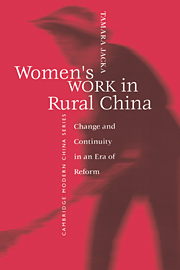Book contents
- Frontmatter
- Contents
- List of Tables
- Acknowledgements
- Abbreviations
- Introduction
- 1 Theorising gender
- 2 Patterns from the past
- 3 Post-Mao reforms
- 4 Families
- 5 Education and politics
- 6 Domestic work
- 7 Agriculture
- 8 Entrepreneurs on the farm
- 9 Industry
- 10 Conclusion
- Appendix 1 Summary of information on sample families in rural Beijing, Shandong and Sichuan
- Appendix 2 Employment in sample township enterprises in rural Beijing, Shandong and Sichuan
- Notes
- Bibliography
- Index
8 - Entrepreneurs on the farm
Published online by Cambridge University Press: 20 March 2010
- Frontmatter
- Contents
- List of Tables
- Acknowledgements
- Abbreviations
- Introduction
- 1 Theorising gender
- 2 Patterns from the past
- 3 Post-Mao reforms
- 4 Families
- 5 Education and politics
- 6 Domestic work
- 7 Agriculture
- 8 Entrepreneurs on the farm
- 9 Industry
- 10 Conclusion
- Appendix 1 Summary of information on sample families in rural Beijing, Shandong and Sichuan
- Appendix 2 Employment in sample township enterprises in rural Beijing, Shandong and Sichuan
- Notes
- Bibliography
- Index
Summary
IN the last chapter I discussed the feminisation of agriculture, that is, a trend in which women are increasingly taking charge of agriculture, while more and more men move into off-farm non-agricultural work. This chapter and the following one add a further degree of complexity to this picture, discussing trends which are occurring within or alongside this one.
Here I wish to focus first of all on the recent development of domestic sidelines and the courtyard economy; areas of work dominated by women. Second, I shall look at the emergence of specialised households (zhuanyehu) and private enterprises (getihu and siying qiye) run by women as an extension of, or specialisation in, activities in the courtyard economy. This chapter analyses the development of women's work in the courtyard economy in terms of the motives of both the state and women themselves, and undertakes a critical examination of the Women's Federation's emphasis on the courtyard economy as a key element in a strategy for improving the economic and social position of rural women.
It will become clear that what distinguishes the areas of work considered below is not so much their content, as their organisation and their perceived location, both physically and in the economy.
- Type
- Chapter
- Information
- Women's Work in Rural ChinaChange and Continuity in an Era of Reform, pp. 143 - 161Publisher: Cambridge University PressPrint publication year: 1997

